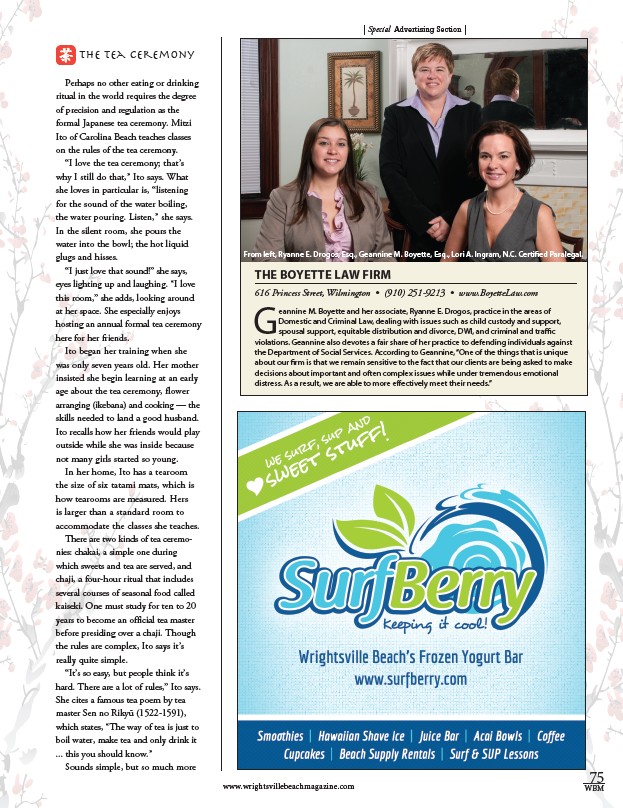
75
| Special Advertising Section |
From left, Ryanne E. Drogos, Esq., Geannine M. Boyette, Esq., Lori A. Ingram, N.C. Certified Paralegal.
The BoyeTTe Law Firm
616 Princess Street, Wilmington • (910) 251-9213 • www.BoyetteLaw.com
G eannine M. Boyette and her associate, Ryanne E. Drogos, practice in the areas of
Domestic and Criminal Law, dealing with issues such as child custody and support,
spousal support, equitable distribution and divorce, DWI, and criminal and traffic
violations. Geannine also devotes a fair share of her practice to defending individuals against
the Department of Social Services. According to Geannine, “One of the things that is unique
about our firm is that we remain sensitive to the fact that our clients are being asked to make
decisions about important and often complex issues while under tremendous emotional
distress. As a result, we are able to more effectively meet their needs.”
www.wrightsvillebeachmagazine.com WBM
The Tea Ceremony
Perhaps no other eating or drinking
ritual in the world requires the degree
of precision and regulation as the
formal Japanese tea ceremony. Mitzi
Ito of Carolina Beach teaches classes
on the rules of the tea ceremony.
“I love the tea ceremony; that’s
why I still do that,” Ito says. What
she loves in particular is, “listening
for the sound of the water boiling,
the water pouring. Listen,” she says.
In the silent room, she pours the
water into the bowl; the hot liquid
glugs and hisses.
“I just love that sound!” she says,
eyes lighting up and laughing. “I love
this room,” she adds, looking around
at her space. She especially enjoys
hosting an annual formal tea ceremony
here for her friends.
Ito began her training when she
was only seven years old. Her mother
insisted she begin learning at an early
age about the tea ceremony, flower
arranging (ikebana) and cooking — the
skills needed to land a good husband.
Ito recalls how her friends would play
outside while she was inside because
not many girls started so young.
In her home, Ito has a tearoom
the size of six tatami mats, which is
how tearooms are measured. Hers
is larger than a standard room to
accommodate the classes she teaches.
There are two kinds of tea ceremo-nies:
chakai, a simple one during
which sweets and tea are served, and
chaji, a four-hour ritual that includes
several courses of seasonal food called
kaiseki. One must study for ten to 20
years to become an official tea master
before presiding over a chaji. Though
the rules are complex, Ito says it’s
really quite simple.
“It’s so easy, but people think it’s
hard. There are a lot of rules,” Ito says.
She cites a famous tea poem by tea
master Sen no Rikyū (1522-1591),
which states, “The way of tea is just to
boil water, make tea and only drink it
... this you should know.”
Sounds simple, but so much more